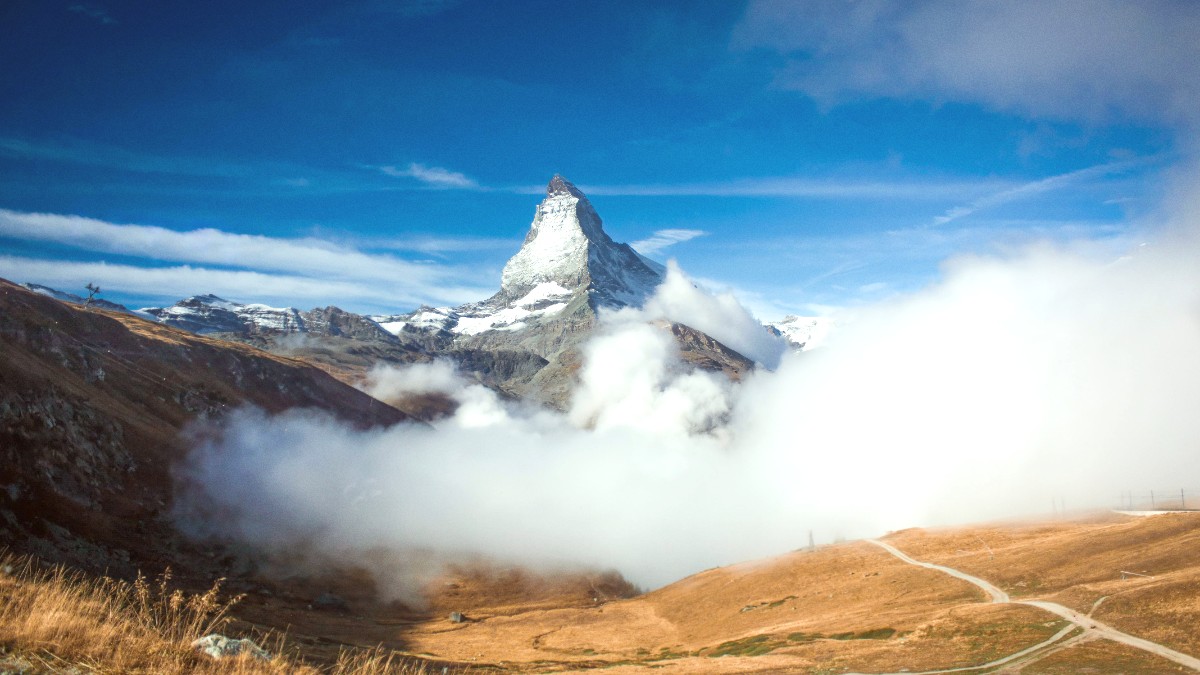
Valais, Switzerland
Winter (December - March): Cold temperatures, abundant snowfall. Daily averages range from -5°C to 5°C (23°F to 41°F). Snow depth on slopes reaches several meters. Air feels crisp and dry, with lower humidity.
Spring (April - May): Transition period. Temperatures slowly rise from 0°C to 15°C (32°F to 59°F). Snow melts at lower elevations, revealing green pastures, while higher slopes retain snow cover. Weather can change quickly, with sun, rain, and late snow.
Mountain weather changes quickly. Sudden temperature drops, strong winds, and rapid cloud cover occur even on sunny days. Summer afternoons often bring thunderstorms; these develop rapidly.
Always check local forecasts (e.g., MeteoSwiss app or Zermatt.ch website) before heading out. Pack layers for all seasons.
Skiing & Snowboarding
December to April. Year-round skiing on Matterhorn Glacier Paradise.
Crowds and higher prices.
Hiking & Mountaineering
July to September for reliable weather and open trails.
Afternoon thunderstorms.
Alpine Flower Viewing & Tranquility
Late June to mid-July for flowers. Shoulder seasons (May, October) for quiet atmosphere.
Limited services in low season.
Travel to Switzerland includes specific requirements, as the country is part of the Schengen Area. Understand these rules for smooth entry.
Schengen Visa (Short-stay): Non-Schengen citizens without a visa-waiver agreement require this visa. Apply through the Swiss embassy or consulate. U.S. Citizens: No Schengen visa needed for tourism or business stays up to 90 days.
Valid 3 months beyond departure, issued in last 10 years, 2 blank pages.
Bank statements, credit limits, or sponsor letter.
Confirmed hotel bookings or invitation.
Confirmed ticket for Schengen Area departure.
Coverage for medical emergencies, evacuation, trip interruption (€30,000 minimum).
Prioritize your health and safety when visiting Zermatt. The alpine environment presents unique considerations.
Switzerland boasts an excellent healthcare system.
Local emergency numbers:
Mountain weather changes quickly. Always check the local forecast before heading out. Pack layers for all seasons.
Zermatt is known for being one of the more expensive destinations in Switzerland. Careful budgeting manages your expenses.
| Category | Budget Traveler (CHF) | Mid-Range Traveler (CHF) |
|---|---|---|
| Accommodation | 60 - 120 (hostel/guesthouse) | 120 - 300 (3-4 star hotel) |
| Meals | 30 - 60 (supermarket/takeaway) | 60 - 120 (casual restaurants) |
| Activities/Attractions | 20 - 50 (basic hikes/views) | 50 - 150 (Gornergrat, Glacier Paradise) |
Travel to Switzerland includes specific requirements, as the country is part of the Schengen Area. Understand these rules for smooth entry.
Non-Schengen citizens without a visa-waiver agreement typically require this visa. It permits tourism or business stays for up to 90 days within any 180-day period.
Apply through the Swiss embassy or consulate in your home country. Start the process well in advance. The application submission involves forms, supporting documents, and an interview.
People holding U.S. Passports do not need a Schengen visa for tourism or business stays up to 90 days within a 180-day period.
Other Nationalities:
Requirements vary. Check specific needs by contacting the nearest Swiss embassy or consulate. The State Secretariat for Migration (SEM) website provides the most accurate and current information.
Special Permits: General tourist activities in Zermatt do not call for special permits. For guided climbing or mountaineering expeditions, licensed mountain guides manage any necessary local permissions or registrations.
Health-related entry requirements: Switzerland does not have specific health-related entry requirements for general tourism. Ensure routine vaccinations are up-to-date.
Your passport must remain valid for at least three months beyond your planned departure date from the Schengen Area. It must have been issued within the last 10 years. Two blank pages for stamps.
You must show you have enough money to cover your stay and return journey. This includes bank statements, credit card limits, or a letter from a sponsor.
Provide confirmed hotel bookings, a letter of invitation from a host, or other evidence of where you will stay.
Switzerland does not charge a general entry fee for tourists.
Zermatt has a very low crime rate and is considered an extremely safe destination. No specific neighborhoods are considered unsafe. You can feel secure walking around the village, even at night.
A risk in winter, specifically in off-piste and unmonitored areas. Stick to marked ski pistes and hiking trails.
Possible, especially after heavy rain or snowmelt. Trails may close for safety reasons. Pay attention to signage.
Glaciers present hidden dangers. Do not walk on glaciers without a certified mountain guide and proper equipment.